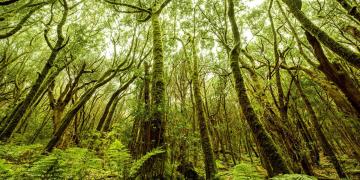Mirova Unveils Three New High-Impact Deals with its USD350 Million Nature-based Carbon Strategy
Mirova, an affiliate of Natixis Investment Managers dedicated to sustainable investing, unveils three new impactful nature-based carbon investments, located in Argentina, Costa Rica and Madagascar, following the successful raising of over US$350 million on this topic since 2020. This significant funding demonstrates Mirova’s capacity to mobilize substantial private capital to support high-integrity projects that contribute to climate change mitigation and adaptation, ecosystem conservation and restoration, improved livelihoods and well-being, as well as gender equality and inclusion.

MOBILIZING PRIVATE CAPITAL FOR CLIMATE & NATURE
Investors and corporates are increasingly rallying around nature conservation and regeneration because they understand how much our economy and development are tied to managing and regenerating natural resources. In addition, an efficient way to reduce carbon emissions is to rely on natural carbon sinks provided by the Earth, which can be found in different ecosystems (forests, wetlands, soils etc.).
Mirova has developed an investment expertise dedicated to "nature-based carbon assets" to empower institutional and corporate investors to contribute to global objectives of nature protection (“Positive Nature”) and carbon neutrality (“Net Zero”). The strategy aims to support high-quality projects dedicated to protecting and restoring nature mostly in emerging markets, as well as supporting farmers in their transition to regenerative agriculture. Mirova seeks to generate carbon credits[1] and co-benefits for local communities, with a particular focus on promoting women's independence.
Mirova’s approach is grounded in the understanding that carbon credits are essential tools for funding emission reduction projects around the world and contribute to achieve the goal of dedicating $300 billion per year to combating climate change, as announced at COP29 in November 2024. To ensure the integrity of carbon credits, projects must adhere to strict criteria, including additionality, measurability, and permanence. Mirova applies rigorous standards and additional layers of analysis to select projects that not only meet these criteria but also generate significant social and environmental co-benefits.
We are witnessing an acceleration in the mobilization of private and corporate investors who are increasingly recognizing the critical importance of decarbonizing their own activities but also to contribute to efforts beyond their value chains. We are proud to present three new investees that promise to deliver strong positive impacts on both environmental and social fronts, while also offering attractive return potentials.
US$40 MILLION INVESTED ACROSS THREE HIGH-IMPACT PROJECTS
Juramento, Argentina
A project developed by Sothys GMBH: a collaboration between Athys Recovery Services and Sofia Commodities.
This large-scale restoration and reforestation initiative targets approximately 3,000 hectares of severely degraded land in Argentina that was previously cleared for intensive agriculture and cattle ranching. The project will focus on restoring native vegetation, improving soil health, and enhancing local biodiversity. It aims to sequester over 2.8 million tons of CO₂ over the next 40 years through reforestation with a mix of native species.

Juramento Project aligns with Athys' mission to lead high-quality biodiversity restoration and nature-based carbon programs through a holistic environmental and social approach with communities and partners who share the same ambition.
This project marks our long-term commitment to restoring ecosystems and contributing meaningfully to the regions we live in.
Ganbos, Costa Rica
This groundbreaking carbon removal initiative aims to restore 30,000 hectares across three regions: Guanacaste South, Guanacaste North, and San Jose and Puntarenas. The project will generate at least 5.2 million carbon credits over the next 40 years by integrating regenerative cattle grazing with large-scale reforestation efforts. Local farmers will be trained and equipped to adopt sustainable agricultural practices that improve productivity while restoring degraded land. The initiative is expected to deliver significant biodiversity co-benefits, as well as improve the livelihoods of local communities through the sale of carbon credits.

We are thrilled to be commencing this project which will regenerate ecosystems whilst improving financial security for farmers and food security for consumers.
iTERAKA, Madagascar
Aiming to reforest 6,000 hectares of degraded land in rural areas of central and eastern Madagascar, the TERAKA Project will involve planting 3 million trees over the next eight years. This community-led initiative is based on the International Small Group and Tree Planting Program (TIST) model, empowering smallholder farmers by providing training and financial support to implement reforestation activities on their land. The project not only aims to sequester approximately 1.5 million tons of CO₂ over 30 years but also has a strong focus on gender inclusion, supporting over 15,000 farmers, particularly women and youth, to retain ownership of the planted trees and their products.

This project not only addresses climate change but also fosters community empowerment and gender equality, showcasing the transformative power of sustainable practices.


